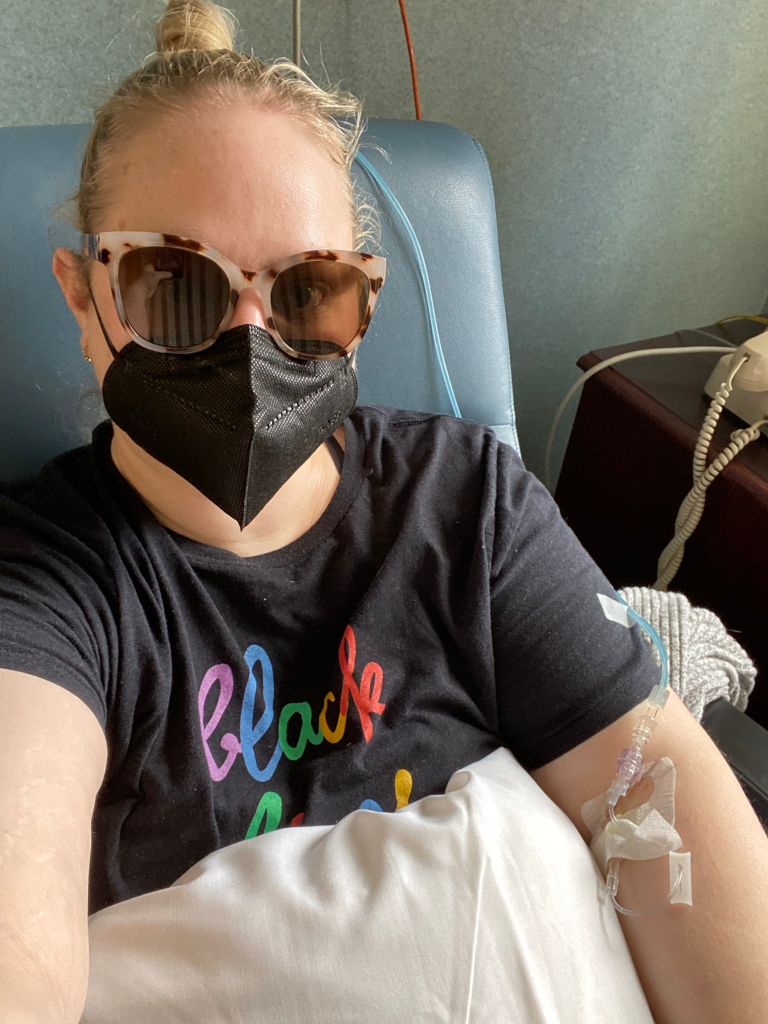Vyepti (eptinezumab) is a monoclonal antibody medication that is FDA approved for prevention of Chronic Migraine (14 or more headache days a month). It blocks a protein in the brain called CGRP, which is thought to be a cause of Migraine attacks. The medication is administered by IV in a clinic setting. I’ve been receiving Vyepti infusions for about two years, and I now have enough experience with the medication and process to share the pros and cons from my perspective.

Patient experiences with medications for Migraine prevention can (and do) vary widely from person to person. My experience with efficacy and side effects might be very different from yours. However, as more people with Chronic Migraine are considering this infusion as the next step in their Migraine prevention journey, hearing about other patients’ experiences can still be helpful.
PROS
- My migraine attacks are easier to treat. Since I’ve been receiving Vyepti infusions I’ve noticed a very clear pattern: For the first two months after the infusion, my Migraine attacks respond better to treatment medications. This effect starts to taper off in the weeks before the next infusion. The contrast is always impossible to ignore.
- Minimal side effects. I haven’t experienced any side effects from Vyepti. So many of the prevention medications I have tried, most of which were not developed for Migraine, came with debilitating, frustrating and demoralizing side effects. It’s such a relief to find that I can tolerate this medication with absolutely no issues.
- I respond to it. This is the first medication for migraine prevention I have ever had any beneficial response to. I’ve been seeking relief from frequent, debilitating Chronic Migraine for more than 15 years, and I have tried so many medications, procedures and other interventions. It’s a big deal to finally see any improvement.
CONS
- No change in Migraine attack frequency. Although I have found my attacks to be more responsive to treatment medications since starting Vyepti, unfortunately there has been absolutely no change in the number of days I experience Migraine symptoms each month.
- Cost. As with all of these newer medications for which no generics exist, Vyepti is extremely expensive. I recently received a bill from the hospital where I get my infusions that shows how much my insurance company was billed ($29,000), how much insurance paid ($4,000) and how much I owe ($1,200). It’s not easy to find ways to pay $1,200 four times a year to receive this treatment. Thankfully they’re great about allowing me to break the cost into smaller monthly payments.
THINGS TO KNOW
- It’s expensive. I’m not eligible for any pharmaceutical company coupon programs because I am insured through Medicare. Thankfully, my insurance company pays for the vast majority of the cost. They tried to deny the claims initially, but eventually relented. If you are insured by a commercial insurance plan and not a public plan (Medicare, Medicaid, Indian Health Service), you may be eligible for Vyepti’s copay assistance program. Learn more here: VYEPTI CONNECT COPAY ASSISTANCE.
- Vyepti is administered by IV in a clinic. Unlike other anti-CGRP medications for migraine prevention, which are self-administered at home via injection, Vyepti is delivered by IV in a clinic setting. I go to the Treatment and Procedure Center at my local hospital to get my infusions.
- The infusion takes about 30 minutes. The actual time for the medication to be administered takes just 30 minutes. The time it takes to check in for your appointment, for your IV to be placed and for the medication to be delivered from the in house pharmacy varies widely depending on the clinic where you receive your infusion.
- Minimal side effects. As with other anti-CGRP medications for Migraine prevention, the most common side effects associated with Vyepti are generally mild to moderate and include things like nausea, constipation, headache, dry mouth and fatigue.
Sources:
CGRP Receptors for Migraine | WebMD
Seeking Relief With Anti-CGRPs | American Migraine Foundation